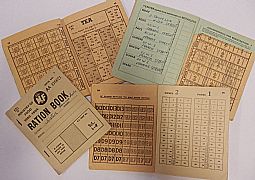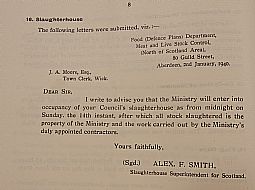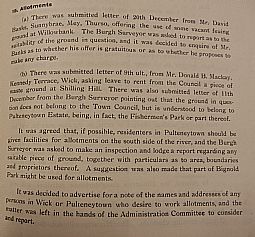Week 19: 8-14 January 1940
In Finland, the Soviet 44th Division broke off its attack on the Finnish defences, having reportedly lost some 22,000 men in the campaign to the Finns’ 2,700. On 10 January a German plane carrying Hitler’s plans for an invasion of Belgium and the Low Countries (scheduled to take place the following week) crash-landed at Mechelen in Belgium. Because the Allies had captured the documents, and because of bad weather, Hitler called off the planned January invasion.
![]() On 8 January Britain introduced food rationing for the first time in the war (fuel had been rationed since the beginning in September): bacon and ham was rationed to 4ozs a week, sugar to 12ozs, and butter to 4ozs. (More foodstuffs would be rationed later on in the war.)
On 8 January Britain introduced food rationing for the first time in the war (fuel had been rationed since the beginning in September): bacon and ham was rationed to 4ozs a week, sugar to 12ozs, and butter to 4ozs. (More foodstuffs would be rationed later on in the war.)
 People were given a ration book with coupons, and the coupons were exchanged for food. Bread, fresh vegetables and fruit were not rationed, but in practice could be hard to find; fish wasn’t rationed during the war either, and often supplemented the diets of the inhabitants of Caithness, though its price in the shops rose as the war progressed.
People were given a ration book with coupons, and the coupons were exchanged for food. Bread, fresh vegetables and fruit were not rationed, but in practice could be hard to find; fish wasn’t rationed during the war either, and often supplemented the diets of the inhabitants of Caithness, though its price in the shops rose as the war progressed.
 As part of the regulation of Britain’s food industry, the Government now effectively took over and nationalised all the country’s slaughterhouses: “from midnight on Sunday, the 14th instant … all stock slaughtered is the property of the Ministry and the work carried out by the Ministry’s duly appointed contractors”.
As part of the regulation of Britain’s food industry, the Government now effectively took over and nationalised all the country’s slaughterhouses: “from midnight on Sunday, the 14th instant … all stock slaughtered is the property of the Ministry and the work carried out by the Ministry’s duly appointed contractors”.
![]() There was a real concern that the shortages caused by the war might result in profiteering. Rationing was one way of dealing with this, and now Price Regulation Committees were set up with the power to regulate prices and prevent retailers, wholesalers or manufacturers overcharging for goods.
There was a real concern that the shortages caused by the war might result in profiteering. Rationing was one way of dealing with this, and now Price Regulation Committees were set up with the power to regulate prices and prevent retailers, wholesalers or manufacturers overcharging for goods.
 Food was very much the issue of the day. The Council considered requests for allotments to grow food on. One suggestion was that Bignold Park in Wick might be converted to allotments, as had been done in the Great War; but it was felt that the damage to the park had been so substantial, and had taken so long to repair, that it might be better to see how long the present war was likely to last before taking such drastic steps.
Food was very much the issue of the day. The Council considered requests for allotments to grow food on. One suggestion was that Bignold Park in Wick might be converted to allotments, as had been done in the Great War; but it was felt that the damage to the park had been so substantial, and had taken so long to repair, that it might be better to see how long the present war was likely to last before taking such drastic steps.
![]() It was noted, however, that “a considerable amount of food could be produced if all 64 schools in Caithness cultivated gardens”, perhaps by converting playgrounds. The Education Committee voted to take it up with the county organiser for agriculture.
It was noted, however, that “a considerable amount of food could be produced if all 64 schools in Caithness cultivated gardens”, perhaps by converting playgrounds. The Education Committee voted to take it up with the county organiser for agriculture.
![]() Thurso Burgh Council met this week. One of item of business was the need “for introducing spray baths for the ratings using the [Town] Hall”, and using the library’s heating system for hot water.
Thurso Burgh Council met this week. One of item of business was the need “for introducing spray baths for the ratings using the [Town] Hall”, and using the library’s heating system for hot water.
![]() But the most poignant moment came at the start of the meeting, when Provost Brims “expressed his good wishes for the New Year to the members and to the community, and expressed the hope that the year we have just entered would bring peace.”
But the most poignant moment came at the start of the meeting, when Provost Brims “expressed his good wishes for the New Year to the members and to the community, and expressed the hope that the year we have just entered would bring peace.”
Coming soon! Week 20, 15-21 January 1940, will be published on Monday 14th January 2013. To view previous issues please use the menus on the right hand side of the page.
Come and join us on Facebook, let us know what you think about Caithness At War, ask any questions you may have or just say hello! Click on the Facebook icon on the right hand menu to be taken directly to our page.
Comments
We had a small barrel "Ferkin" of salt herring which were delicious with tatties. Other fish came by way of dried salt Cod which came in hard pieces which had to be soaked. Another delicacy. We got fresh trout occassionaly from Watten Loch but not often.
Apart frfom not getting much in the wy of fresh fruit we did not starve as we had milk eggs and tatties which we used to share with our cousins. Eggs were sent as far away as London using very elabourately constructed egg boxes with special padding. We sent poultry and of course rabbits away by there thousands. Every week crates of rabbits left Watten Station for the South and every youth had a ferret and associated gear for rabbiting.
Early in the war there was a market for seaguls. During ploughing time a plough was followed by clouds of scorries after worms. I remember one young ploughman carrying a double barreled shotgun on his tractor and when he had a chance blasting at the birds and then collecting bag fulls. The were packed into crates for London but this trade did not last long.
Once the Army and Airforce were billeted in Watten and Castletown the senior officers in their staff cars would arrive at our farm where they would try and scrounge eggs and baking etc. My mother gave what she could but was especially kind with tea and scones to the squaddies who would be parked on the road for hours on end during training manouevres
JC





